Sun Hung Kai Properties Bundle
Who Really Owns Sun Hung Kai Properties?
Understanding the Sun Hung Kai Properties SWOT Analysis is crucial, but have you ever wondered about the power dynamics behind one of Hong Kong's real estate titans? The SHKP ownership structure is a complex web, deeply intertwined with its history and future. Unraveling the Sun Hung Kai owner landscape reveals critical insights into its strategic decisions and long-term vision.
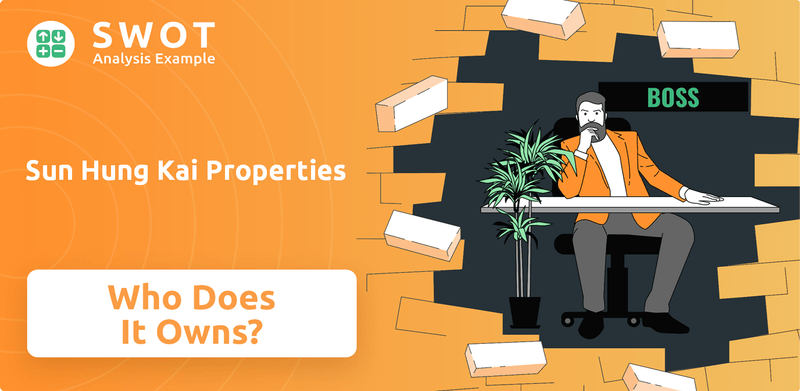
Founded in 1963, Sun Hung Kai Properties has grown into a dominant force in Hong Kong real estate. The legacy of its founders and the influence of the Kwok family are central to its identity. Examining its ownership provides a lens through which to understand its financial performance, investment portfolio, and ongoing property development projects.
Who Founded Sun Hung Kai Properties?
Sun Hung Kai Properties (SHKP) was established in 1963. The founders were Kwok Tak-seng, Fung King-hey, and Lee Shau-kee. This initial structure set the stage for the company's dominance in the Hong Kong real estate market.
Kwok Tak-seng, with a background in textiles, focused on land acquisitions and development. Fung King-hey brought financial expertise, and Lee Shau-kee, a seasoned property investor, contributed to real estate ventures. Their combined skills were crucial for SHKP's early success.
While the exact initial equity splits aren't publicly available, the founders held significant stakes. Their collaboration was key to capitalizing on Hong Kong's economic boom and the growing demand for property. This shared vision helped establish SHKP as a major player in property development.
The founders aimed to create a strong presence in Hong Kong's property market. Their strategy focused on meeting the rising demand for housing and commercial spaces.
The founders likely had agreements on operational control and strategic direction. This collaborative approach was essential for navigating the early stages of the company.
There is no widely available information about early ownership disputes or buyouts among the founders. This suggests a stable foundation.
The company’s focus was on the rapid economic growth in Hong Kong. This strategic focus helped them to secure a strong position.
The founders' shared control facilitated effective strategic decision-making. This approach helped SHKP to grow rapidly.
The substantial stakes held by the three founders formed the bedrock of the company's control. This ensured stability in the early years.
The early years of SHKP were marked by a strong collaborative spirit among the founders. Their combined expertise and shared vision for the future of Hong Kong's property market laid the groundwork for the company's long-term success. To understand more about how SHKP has grown, consider reading about the Growth Strategy of Sun Hung Kai Properties.
Sun Hung Kai Properties SWOT Analysis
- Complete SWOT Breakdown
- Fully Customizable
- Editable in Excel & Word
- Professional Formatting
- Investor-Ready Format
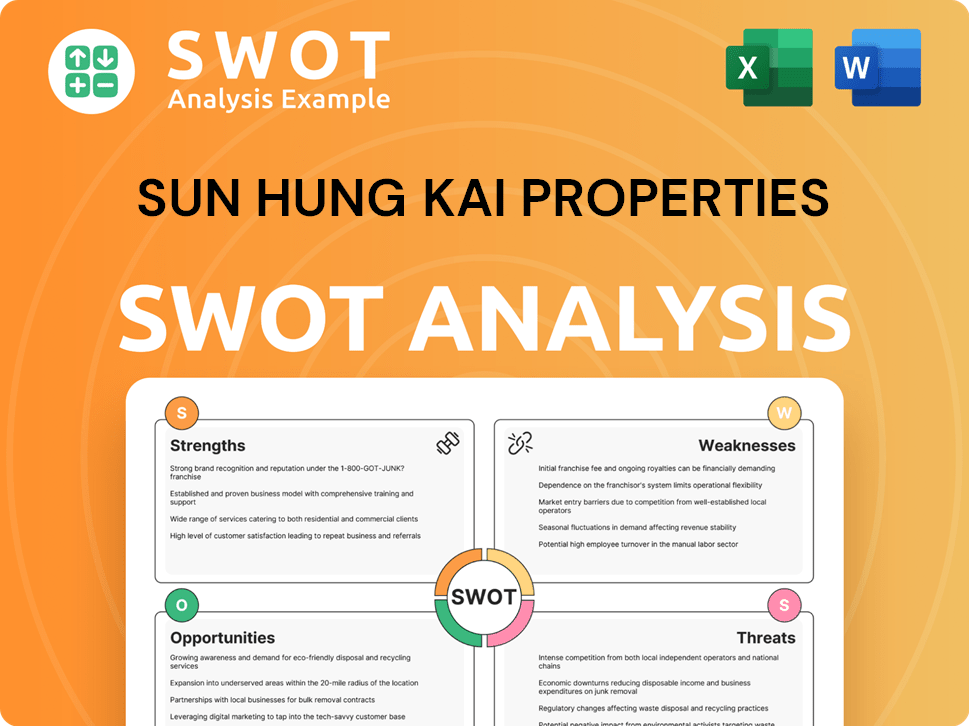
How Has Sun Hung Kai Properties’s Ownership Changed Over Time?
The evolution of Sun Hung Kai Properties (SHKP) ownership has been marked by key events since its initial public offering (IPO) in 1972. The IPO was a pivotal moment, transitioning the company from private ownership to a publicly listed entity on the Hong Kong Stock Exchange. This move allowed for broader investment and increased capital raising capabilities, while the founding Kwok family maintained a significant controlling stake. This structure is typical of many large Hong Kong companies, where founding families often retain substantial influence.
The Kwok family's continued dominance, primarily through trusts and holding companies, has been a defining characteristic of SHKP's ownership. This structure has enabled long-term strategic planning and consistent execution of the company's vision. The presence of major institutional investors, including global asset management firms and index funds, further shapes the ownership landscape, reflecting SHKP's importance in the Hong Kong real estate market and its inclusion in major market indices. As of early 2025, the interplay between the Kwok family's control and the influence of institutional investors continues to define the company's strategic direction and operational decisions.
| Event | Impact on Ownership | Date |
|---|---|---|
| Initial Public Offering (IPO) | Transitioned from private to public ownership; Kwok family retained control. | 1972 |
| Institutional Investment Growth | Increased institutional holdings; diversified shareholder base. | Ongoing |
| Family Succession and Governance | Impacted long-term strategic planning and company direction. | Ongoing |
Major institutional investors hold significant stakes in SHKP. Their collective holdings represent a substantial portion of the publicly traded shares. Specific percentages from these institutional investors fluctuate with market dynamics. For instance, as of December 31, 2024, significant institutional holdings were noted by various global investment houses, although exact figures vary based on reporting periods. These changes in shareholding, particularly the concentration of ownership within the Kwok family, have allowed for consistent long-term strategic planning, though they also highlight the importance of family governance in the company's overall strategy and succession planning.
The Kwok family remains the primary owner of Sun Hung Kai Properties, maintaining significant control. Institutional investors hold substantial stakes, influencing strategic direction. The company's ownership structure has allowed for long-term planning and consistent execution.
- Kwok family control is a key feature of SHKP ownership.
- Institutional investors play a significant role in the shareholder base.
- The ownership structure supports long-term strategic planning.
- Focus on the Hong Kong real estate market.
Sun Hung Kai Properties PESTLE Analysis
- Covers All 6 PESTLE Categories
- No Research Needed – Save Hours of Work
- Built by Experts, Trusted by Consultants
- Instant Download, Ready to Use
- 100% Editable, Fully Customizable
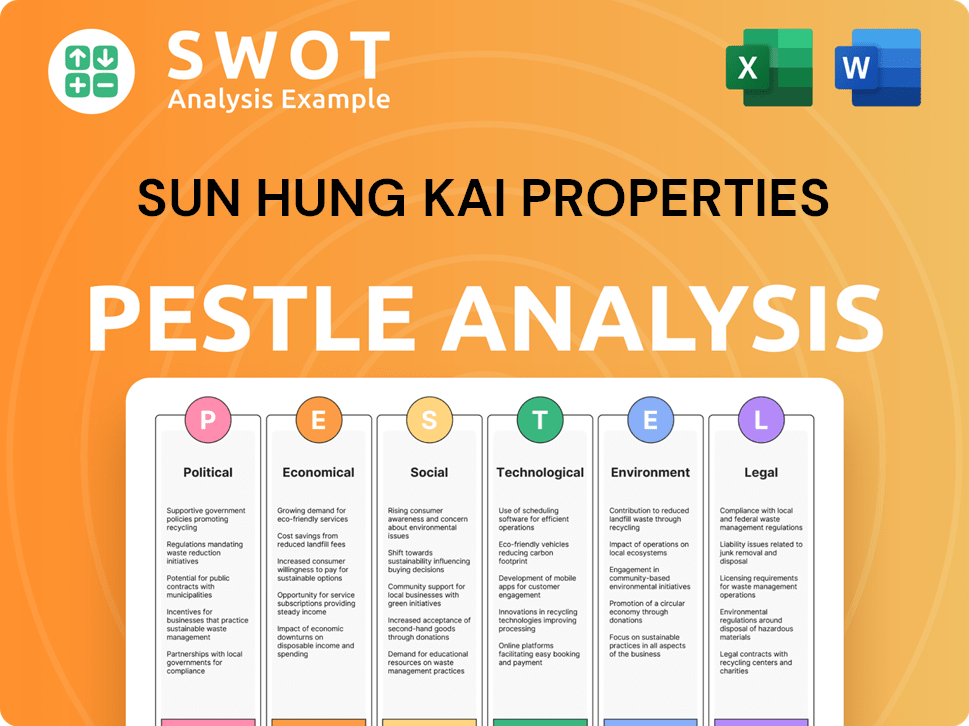
Who Sits on Sun Hung Kai Properties’s Board?
The current Board of Directors of Sun Hung Kai Properties (SHKP) includes a mix of family members, long-term executives, and independent non-executive directors. As of early 2025, key figures include Raymond Kwok Ping-luen and Adam Kwok Kai-fai, representing the Kwok family, who are the major shareholders. These individuals hold significant executive roles, demonstrating the family's direct involvement in operations and strategic planning. Independent non-executive directors provide external perspectives, contributing to corporate governance and ensuring compliance.
The composition of the board reflects the company's history and the influence of the Kwok family, who founded Sun Hung Kai Properties. The board's structure is designed to balance family interests with independent oversight, which is crucial for the company's continued success in the competitive Hong Kong real estate market. Understanding the board's makeup is essential for anyone looking into SHKP ownership and its strategic direction.
| Board Member | Role | Family Affiliation |
|---|---|---|
| Raymond Kwok Ping-luen | Executive Director | Kwok Family |
| Adam Kwok Kai-fai | Executive Director | Kwok Family |
| Independent Non-Executive Directors | Various | N/A |
The voting structure at Sun Hung Kai Properties generally follows a one-share-one-vote system for its publicly traded shares. However, the Kwok family's substantial ownership, mainly through trusts, gives them significant control over major decisions, including board appointments, dividend policies, and strategic investments. While there haven't been recent proxy battles, the family's dominant voting power significantly influences decision-making. This concentrated control supports long-term strategic planning and stability. For a broader perspective on the competitive landscape, consider looking at the Competitors Landscape of Sun Hung Kai Properties.
The board includes family members, executives, and independent directors.
- The Kwok family holds substantial voting power.
- This control influences major corporate decisions.
- The structure aims for a balance between family interests and independent oversight.
- Understanding SHKP ownership is key to grasping the company's direction.
Sun Hung Kai Properties Business Model Canvas
- Complete 9-Block Business Model Canvas
- Effortlessly Communicate Your Business Strategy
- Investor-Ready BMC Format
- 100% Editable and Customizable
- Clear and Structured Layout
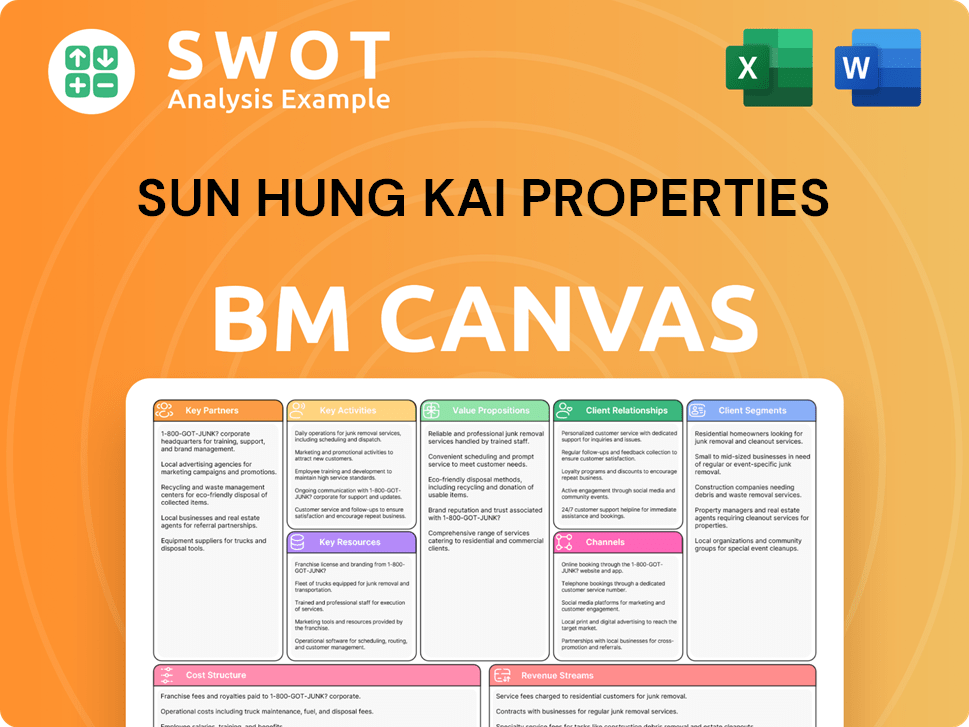
What Recent Changes Have Shaped Sun Hung Kai Properties’s Ownership Landscape?
Over the past few years (2022-2025), the ownership structure of Sun Hung Kai Properties (SHKP) has remained largely stable, with the Kwok family maintaining significant control. The company has engaged in share buybacks, which, while not drastically altering the ownership, have incrementally increased the holdings of remaining shareholders. There have been no major announcements regarding significant shifts in ownership or large-scale mergers and acquisitions that would have significantly changed the overall ownership landscape.
The leadership of SHKP continues to reflect the Kwok family's influence, with younger family members taking on more prominent roles. This suggests a planned succession within the family, maintaining the family's long-term involvement in the company. The Hong Kong property market's fluctuations and regulatory changes have indirectly influenced investor sentiment, but have not led to major shifts in the core ownership structure. Public statements from SHKP primarily focus on its development pipeline and financial performance, with no indications of forthcoming significant ownership changes beyond the existing family control.
| Aspect | Details | Status (2022-2025) |
|---|---|---|
| Kwok Family Control | Significant influence | Maintained |
| Share Buybacks | Capital management strategy | Ongoing |
| Major M&A or Secondary Offerings | Significant changes in ownership | None announced |
The Kwok family's control of SHKP has remained consistent. Share buybacks have slightly increased the percentage ownership of existing shareholders. There have been no major public announcements of significant shifts in the ownership structure.
Younger Kwok family members are taking on greater responsibilities. Hong Kong's real estate market fluctuations have not significantly impacted the core ownership. The company's focus remains on development and financial performance.
No major changes in ownership have been indicated by the company. Any potential privatization or significant public listing changes would be major announcements. The company seems to be sticking to its current structure.
The Kwok family remains the primary owner of Sun Hung Kai Properties. Institutional investors continue to be involved. The management team is also a key player in the company.
Sun Hung Kai Properties Porter's Five Forces Analysis
- Covers All 5 Competitive Forces in Detail
- Structured for Consultants, Students, and Founders
- 100% Editable in Microsoft Word & Excel
- Instant Digital Download – Use Immediately
- Compatible with Mac & PC – Fully Unlocked
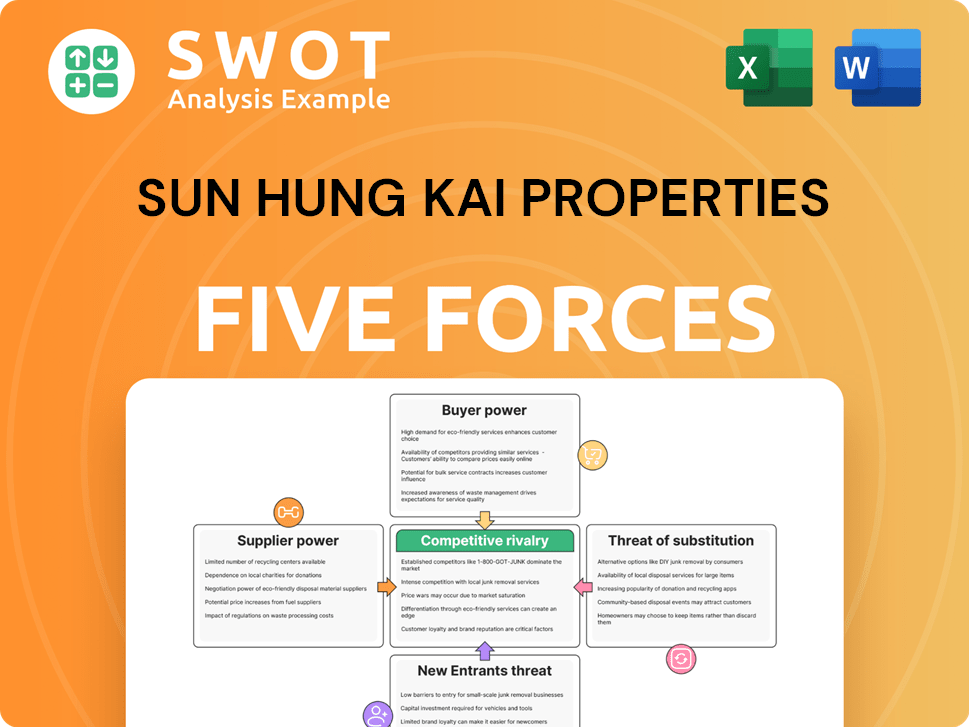
Related Blogs
- What are Mission Vision & Core Values of Sun Hung Kai Properties Company?
- What is Competitive Landscape of Sun Hung Kai Properties Company?
- What is Growth Strategy and Future Prospects of Sun Hung Kai Properties Company?
- How Does Sun Hung Kai Properties Company Work?
- What is Sales and Marketing Strategy of Sun Hung Kai Properties Company?
- What is Brief History of Sun Hung Kai Properties Company?
- What is Customer Demographics and Target Market of Sun Hung Kai Properties Company?
Disclaimer
All information, articles, and product details provided on this website are for general informational and educational purposes only. We do not claim any ownership over, nor do we intend to infringe upon, any trademarks, copyrights, logos, brand names, or other intellectual property mentioned or depicted on this site. Such intellectual property remains the property of its respective owners, and any references here are made solely for identification or informational purposes, without implying any affiliation, endorsement, or partnership.
We make no representations or warranties, express or implied, regarding the accuracy, completeness, or suitability of any content or products presented. Nothing on this website should be construed as legal, tax, investment, financial, medical, or other professional advice. In addition, no part of this site—including articles or product references—constitutes a solicitation, recommendation, endorsement, advertisement, or offer to buy or sell any securities, franchises, or other financial instruments, particularly in jurisdictions where such activity would be unlawful.
All content is of a general nature and may not address the specific circumstances of any individual or entity. It is not a substitute for professional advice or services. Any actions you take based on the information provided here are strictly at your own risk. You accept full responsibility for any decisions or outcomes arising from your use of this website and agree to release us from any liability in connection with your use of, or reliance upon, the content or products found herein.